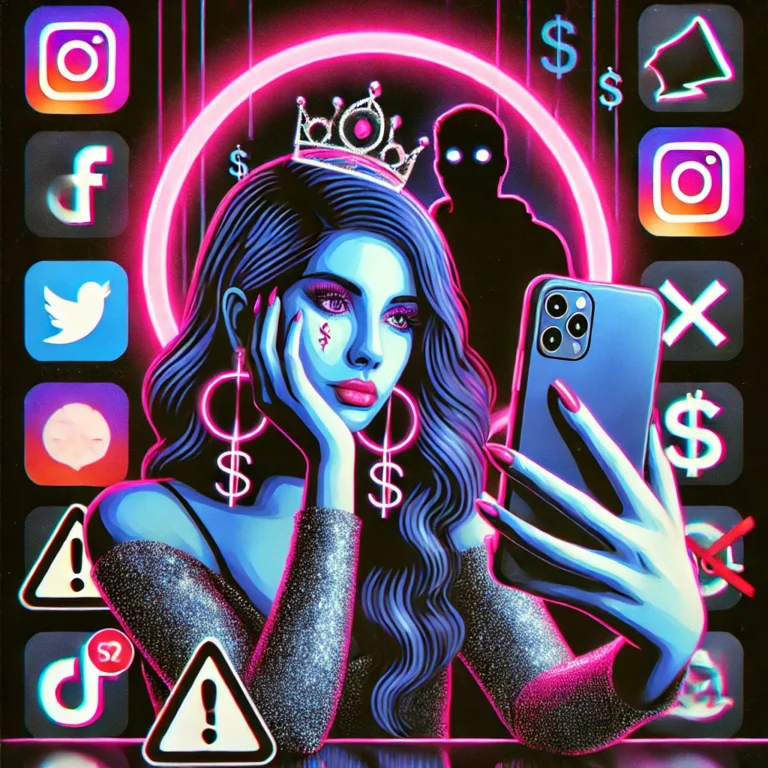Introduction
Social media has revolutionized the way people interact, communicate, and consume content. It has given rise to influencers—individuals who shape trends, opinions, and consumer behavior. However, beneath the surface of curated perfection lies a troubling reality. This article explores the hidden dangers, ethical concerns, and psychological effects of influencer culture.
The Rise of Influencers
The digital era has transformed ordinary individuals into internet celebrities. With millions of followers, these content creators wield significant influence over audiences worldwide. They promote brands, set fashion trends, and even impact political opinions. But with great power comes great responsibility—one that is often overlooked.
The Pressure to Maintain Perfection
Many online personalities feel immense pressure to maintain an idealized image. This leads to heavily edited photos, scripted content, and unrealistic portrayals of daily life. The constant need to project perfection can have severe consequences, including anxiety, depression, and burnout.
The Allure of Wealth and Fame
The promise of financial success entices many to pursue careers as content creators. Brand partnerships, sponsored posts, and exclusive deals offer lucrative opportunities. However, the pursuit of wealth can sometimes lead to unethical behavior, including dishonest promotions and exaggerated claims.
Ethical Concerns in Influencer Marketing
Deceptive Advertising
Some influencers promote products without proper disclosure, misleading their audiences. Hidden sponsorships and fake testimonials are rampant in the industry, raising concerns about transparency and trust.
Harmful Trends and Challenges
From dangerous stunts to unrealistic beauty standards, social media personalities often set trends without considering their consequences. Viral challenges, sometimes life-threatening, influence impressionable followers to engage in risky behavior.
The Impact on Followers
Mental Health Issues
Studies show that excessive social media consumption contributes to low self-esteem, anxiety, and depression. Comparing one’s life to an influencer’s carefully curated feed can lead to feelings of inadequacy.
Unrealistic Expectations
Many followers aspire to the seemingly effortless lifestyle showcased online, unaware of the behind-the-scenes struggles. This fuels unrealistic expectations, particularly among younger audiences.
Scandals and Controversies
From fraud allegations to inappropriate behavior, numerous online personalities have faced backlash for their actions. Cancel culture has further intensified the scrutiny surrounding influencers, leading to damaged reputations and career downfalls.
The Role of Social Media Platforms
Platforms like Instagram, TikTok, and YouTube have attempted to regulate misleading content through policies and guidelines. However, enforcement remains inconsistent, and many unethical practices continue unchecked.
How to Consume Content Wisely
Verify Information
Not everything seen online is factual. Cross-checking sources and questioning endorsements can prevent misinformation.
Follow Ethical Creators
Supporting individuals who prioritize honesty, transparency, and responsible content creation can encourage a healthier digital landscape.
Limit Social Media Usage
Taking breaks from online platforms can reduce mental health risks and promote a balanced lifestyle.
Conclusion
While social media offers incredible opportunities, it also comes with significant downsides. Understanding the realities behind influencer culture helps consumers navigate the digital world more consciously. Awareness and responsible engagement can create a healthier and more authentic online experience.
FAQs
1. How can influencers be more transparent with their audience? They should disclose sponsorships, share behind-the-scenes realities, and promote authenticity.
2. Why do people follow influencers despite ethical concerns? Many admire their lifestyles, seek entertainment, or trust their recommendations.
3. Can social media platforms do more to regulate unethical practices? Yes, stricter policies and better enforcement could reduce deceptive advertising and harmful content.
4. How can followers protect themselves from influencer manipulation? By thinking critically, verifying claims, and recognizing the distinction between reality and online portrayals.5. Is influencer culture here to stay? Yes, but it will likely evolve as audiences become more aware and demand greater authenticity.
